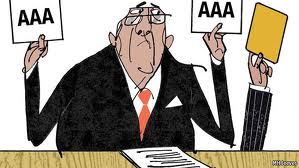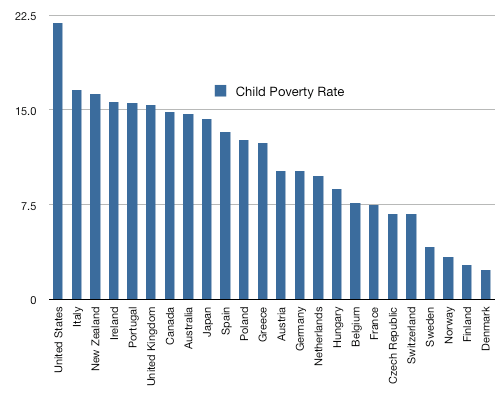By Marshall Auerback

Like the horrible aftertaste that comes from throwing up the contents of one’s stomach after a night of binge drinking, the ratings agencies have reared their ugly heads again. David Beers, head of S&P’s government debt rating unit, announced Friday night that S&P has downgraded the U.S. credit rating for the first time, from AAA to AA. It’s a sham: S&P’s whole analytical framework reflects ignorance about modern money. If the US government, Treasury, and the Federal Reserve, capitulate to this outrageous act of economic extortion, it will effectively be sanctioning a beer hall putsch by the rentier class.
Justifying its decision, Standard and Poor said “political brinkmanship” in the debate over the debt had made the U.S. government’s ability to manage its finances “less stable, less effective and less predictable.” It said the bipartisan agreement reached this week to find at least $2.1 trillion in budget savings “fell short” of what was necessary to tame the nation’s debt over time and predicted that leaders would not be likely to achieve more savings in the future.
“It’s always possible the rating will come back, but we don’t think it’s coming back anytime soon,” said Beers.
Of course, the response from Treasury was equally inane:
“A judgment flawed by a $2 trillion error speaks for itself,” a Treasury spokesman said last Friday.
$2 trillion, $4 trillion, who cares if the S&P is math-challenged? It’s irrelevant! The notion that the US can arbitrarily summon up the ability to register $4 trillion in “savings” demanded by Standard & Poor as the price for upholding America’s AAA rating is nonsensical, as it ignores the impact that the withdrawal of income will have on the overall economy and, by extension, the size of the government deficits that the ratings agencies regularly decry. An ex post outcome is never guaranteed by an ex ante action undertaken by government. In other words, it’s not a number that can be controlled by the actions of political hacks in DC, so it’s truly pointless debating whether S&P screwed up on its calculations or not. And in their ideological zeal to demonize public debt and budget deficits, all of the ratings agencies are by definition relying on more private sector debt to drive growth, given that this is the only way to replace the government spending withdrawn. How did that work out for us in the last decade?
Treasury would have been on stronger ground if it had simply pointed out the sterling historic track record of the ratings agencies. Recall how well the S&P (along with Moody’s and Fitch) covered themselves with glory during the housing bubble, rating toxic subprime junk as AAA rated paper. Not only were the agencies politically corrupted by virtue of their incestuous ties to Wall Street, but criminally incompetent as well. Yves Smith of Naked Capitalism gives a perfect illustration of the latter:
The biggest proof of criminal incompetence was their downgrades of RMBS versus CDOs made pretty much entirely of the same RMBS. They started downgrading RMBS en masse in July 2007. They didn’t start marking down CDOs until six month later, and the process took another six months. Yet it should have been impossible to downgrade the RMBS and not the CDOs at the same time. The downgrades were based on the failures of the underlying loans. You can’t have it show up in one product and not the other.
And S&P continues to screw up MBS ratings in the wake of heightened scrutiny (see here).
Credit ratings are based on ability to pay and willingness to pay. And, as Alan Greenspan explained in 1997, a sovereign issuer always has the ability to pay:
[A] government cannot become insolvent with respect to obligations in its own currency. A fiat money system, like the ones we have today, can produce such claims without limit.
Whether it chooses to make those payments is another matter. But that’s a matter of politics, not economics.
To be fair to Mr. Beers, his agency did specifically cite the political brinkmanship of a number of US Congressmen, who seemed far too inclined to contemplate the option of default as a means of securing greater spending cuts on the part of the US government. But that wasn’t the full story. S&P placed particular emphasis on the size of the cuts, implicitly suggesting that larger cuts would have superseded the political questions. That’s intellectual dishonesty at its worst.
Here are a few questions the S&P ought to have considered before it issued its debt downgrade:
Is government spending so high that it is competing with private sector spending plans? Certainly not – substantial amounts of plant and equipment remain idle, unemployment remains at depression like levels, and there is ample capacity for firms to expand if they want to do so. Businesses, however, are constrained by inadequate demand for their output, a phenomenon which would become even worse if the US were to follow the prescribed level of cuts advocated by S&P to retain its AAA rating with these economic blackmailers. That is a real cost (and it also drives those “horrible” government deficits higher, as tax revenues plunge and social welfare expenditures via the automatic stabilizers rise).
Is government issuing so much debt that it is causing interest rates to skyrocket? Not in the slightest. Rates have actually gone NEGATIVE in term yields under 12 months over the past few weeks (so much for the notion that the end of QE2 would drive rates sky-high). We have a deflation problem, not inflation. Widespread austerity of the sort now advocated by the S&P is destroying economic growth and the claims by politicians and economists that we would enjoy a “fiscal contraction expansion” if only the government stopped “crowding out” the private sector are now being revealed as bogus propaganda. And the political dysfunction that Mr. Beers describes could have easily been avoided through a number of options, which would not have left the country in the hands of irrational deficit terrorists. As Joe Firestone notes:
Treasury can cease issuing long-term bonds, and sell only three-month bonds. Three-month bond interest rates are generally controlled by overnight rates for bank reserves, and overnight rates can be driven down to near zero by flooding the banks with excess reserves. That’s basically how the Japanese keep their bond interest rates near zero, and that’s how we can do the same.
Firestone is right: A sovereign government like the US only sells securities in order to drain excess reserves to hit its interest rate target. It could always choose to simply leave excess reserves in the banking system, in which case the overnight rate would fall toward whatever rate the central bank offers to pay commercial banks for excess overnight reserves.
Even with our existing legal constraints (predicated on a now non-existent gold standard system in which we are forced to sell bonds before Treasury spends), Treasury/Fed have other tools to counteract the alleged effect of this downgrade. Mr. Bernanke can simply call up the NY Fed and gives Mr. Dudley instructions to buy all the 10-year UST on offer to keep the US 10 year at, say 2.5%. It is an open market operation, which the Fed performs all the time. And the banks cannot lend out these reserves, so it’s not inflationary (see here for more explanation). Then, as Rob Parenteau and I have noted before, every time some so-called “bond market vigilante” tries to push it above 2.5% by shorting Treasuries, the Fed can slam their face into the concrete by having the open market desk buy the hell out of UST until the 10 year yield is back to 2.5%. Burn Fido enough times, yank his chain enough times, and like the Dog Whisperer, he gets it and stops.
Think this can’t be done if the ratings agencies downgrade the US?
Japan is a perfect illustration of how little these downgrades impact borrowing rates for a sovereign government (thanks to Bill Mitchell): In November 1998, the day after the Japanese Government announced a large-scale fiscal stimulus to its ailing economy, Moody’s Investors Service began the first of a series of downgradings of the Japanese Government’s yen-denominated bonds, by taking the Aaa (triple A) rating away. The next major Moody’s downgrade occurred on September 8, 2000.
Then, in December 2001, Moody’s further downgraded the Japan Governments yen-denominated bond rating to Aa3 from Aa2. On May 31, 2002, Moody’s Investors Service cut Japan’s long-term credit rating by a further two grades to A2, or below that given to Botswana, Chile and Hungary. This at a time when the Japanese economy was then almost 1,000 times the size of Botswana’s, had the world’s largest foreign reserves, $446 billion; the world’s largest domestic savings, $11.4 trillion; and about $1 trillion in overseas investments.
In a statement at the time, Moody’s said that its decision “reflects the conclusion that the Japanese government’s current and anticipated economic policies will be insufficient to prevent continued deterioration in Japan’s domestic debt position … Japan’s general government indebtedness, however measured, will approach levels unprecedented in the postwar era in the developed world, and as such Japan will be entering ‘uncharted territory’.”
“Uncharted territory” – well, the last time anybody looked, the Japanese government was still comfortably issuing 10-year government debt at around 1%. That Japan’s debt is largely domestically held is irrelevant: the denomination of the debt, NOT the debt holder is the key consideration.
There are only two sectors to issue bonds to, the domestic private and international. US and Japan are on opposite ends of the spectrum, with the US issuing a lot to the latter (though still more domestically in fact), and Japan issuing a lot to the former. The interesting thing is that this hasn’t mattered at all in the determination of rates–the key difference affecting relative interest rates between the US/Japan and, say, the periphery countries of the euro zone, has been the nature of the monetary system–the US/Japan are currency issuers under flexible foreign exchange, whilst the member states of the European Monetary Union are not. As Scott Fullwiler indicated to me in a recent email exchange, “For the former, rates follow monetary policy; for the latter, rates follow markets’ perceptions of default risk. This is why for the former credit rating downgrades are complete monetary non-events, like QE. Note further that if the int’l sector were to stop buying US debt, this just means that the US trade balance improves and the breakdown of government debt sales starts to look more like Japan’s.”
To argue otherwise is to ignore the actual causation of the transaction, which is that China exports something to the US in exchange for dollars, and then that money goes into their checking account at the Federal Reserve. It’s called a reserve account because it’s the Federal Reserve, and they give it a fancy name. But in reality it is a checking account, just like you or I use. Now China has 3 choices with what they can do with the money in their checking account. They could spend it and buy real assets in the US, which would be great for our economy, or they can put it into another currency (say, euros), in which case the dollar declines, which enhances our export position, or they can put it in another account at the Federal Reserve called a Treasury security, which is nothing more than a savings account. In other words, the bond purchase, if it occurs, comes at the end of the transaction and actually ‘funds’ nothing.
Economist Warren Mosler has noted on numerous occasions that China and others buy US Treasury securities primarily to support the dollar versus their own currencies, and thereby drive exports to the US, and not because they are looking for safe investments per se. That is, it’s a consequence of their drive for ‘competitiveness’ and their desire to net save in US dollars. It takes two to tango. And with no Treasury securities China would be forced to buy state debt, corporate debt, euro debt (say, Greek bonds?), equities, etc. which is highly problematic for them for a variety of reasons.
A final question for Mr. Beers: Is government spending so high that the dollar is crashing in international exchange markets? No. Certainly the dollar has its ups and downs — we’ve got a floating exchange rate and it is supposed to go up and down. So let’s assume that our dollar falls because China no longer wishes to net save in greenbacks. In fact, this has been occurring over the past several months and the bond market has gone up during this period. If this were to go on long enough, the ultimate impact would be that our external balances improve significantly (as does the likely desire of foreigners to accumulate cheap US assets via FDI), because our exports increase, which means the current account deficit goes down and less bonds are available for China to ‘fund’ us”.
Now that’s not the way I would go as a growth strategy, as it entails a “race to the bottom” as far as wages go. Moreover, if budget deficits are not allowed to grow large enough to enable private domestic agents reduce their overall debt levels, then the economy will remain mired in its stagnant state. With austerity being pursued everywhere it is a fool’s hope to think that net exports are going to swing enough to save the day. But from a straight sectoral balances point of view, IF we did export more, these increased exports would mitigate the ability of countries like Japan or China to net save in our currency. By definition, this would also correspondingly reduce their holdings in US Treasuries.
Floating rates float. This is not synonymous with economic and financial degeneracy, as our economic moralists, or the gold bugs seem to imply. Over the past 10 years, the Australian dollar has fluctuated between 50 cents to $1.08 against the greenback. The last time I looked Australia was still surviving and thriving. One can also consider the more extreme case of Russia in 1998, during which its entire financial system imploded and the ruble lost two thirds of its external value against the dollar. Yet the currency itself did not “evaporate” and the ruble remains Russia’s currency unit of account today.
It is questionable how much of this deficit austerianism is ideological and how much is really a misunderstanding (an “innocent fraud” in the words of John Kenneth Galbraith). Governments around the world have been led to believe that they need to issue bonds and collect taxes to finance government spending, and that good policies should be judged by their ability to enforce fiscal austerity. Mainstream economists and ratings agencies such as S&P have guided policymakers into imposing artificial constraints on fiscal policy and government finances, such as issuing bonds when running deficits, debt ceilings, forbidding the central bank to directly buy treasury debt, allowing the markets to set interest rates on government bonds, etc. While last Friday’s downgrade per se probably won’t do much, if anything, to interest rates, growth, and employment, ratings agencies like the S&P reinforce the current deflationary state of affairs because their perverse rating actions simply reinforce efforts for further substantial deficit reduction and a balanced budget amendment. Ironically, if the siren songs of “sound finance” are followed, we will get exactly the outcome now predicted by the likes of Michelle Bachmann: the US WILL become like Greece.














